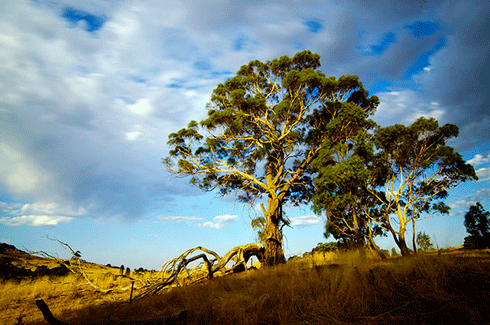
|
Published: 17 November 2014
Tree shock: research shows climate change hitting eucalypts
Eucalypts growing in already hotter areas may find it harder to adapt as climate change increasingly creates a mismatch between forest trees and their home environments.

|
|
Eucalypts sweltering on a 40-plus°C day. Credit:
Flickr/Indigo Skies Photography CC BY-NC-ND 2.0
|
Eucalypts are a distinctive feature of the Australian landscape, and assumed to be hardy and adaptable to environments ranging from hot and dry coastal areas to cooler mountain and alpine regions.
But in a paper published recently in the journal Global Change Biology , lead author Dr John Drake from the Hawkesbury Institute for the Environment, University of Western Sydney, and his colleagues reported that as temperatures increase, eucalypts growing in already-warm locations are likely to be more affected by increased warming than cooler climate eucalypts that experience increased warming in lower-temperature environments.
The research team conducted a climate-shift experiment using 21 seed varieties grown in a series of climate-controlled glasshouses that approximated summer conditions occurring in the seeds' areas of origin.
The researchers compared these home-grown plants to those grown with an additional warming treatment of 3.5°C.
The cool-origin eucalypts responded to the higher temperatures with an increase in photosynthetic activity, leading to enhanced growth of 20–60 per cent.
However, those originating in warm areas responded to increased temperatures with a reduction in photosynthetic capacity and total leaf area, leading to a reduced growth of 10 per cent.
‘The eucalypts’ survival depends on their ability to adjust physiologically to higher temperatures and what we can see is that increased warming in already warm places is likely to affect eucalypt trees more adversely than increased warming in cool places,’ Dr Drake says.
The research results have wider implications for the survival of other warm-origin plants and trees says Professor Mark Tjoelker, another University of Western Sydney researcher who worked on the project with Dr Drake.
‘Cool-origin plants likely have the flexibility to alter physiological and structural traits to cope with warming, while warm-origin plants are likely to be constrained in their ability to alter traits,’ says Professor Tjoelker.
‘These results have widespread implications for the survival and persistence of other warm-origin trees. In addition, increased water stress in warm areas experiencing drought are likely to accentuate already negative effects even further.’
Source: University of Western Sydney



